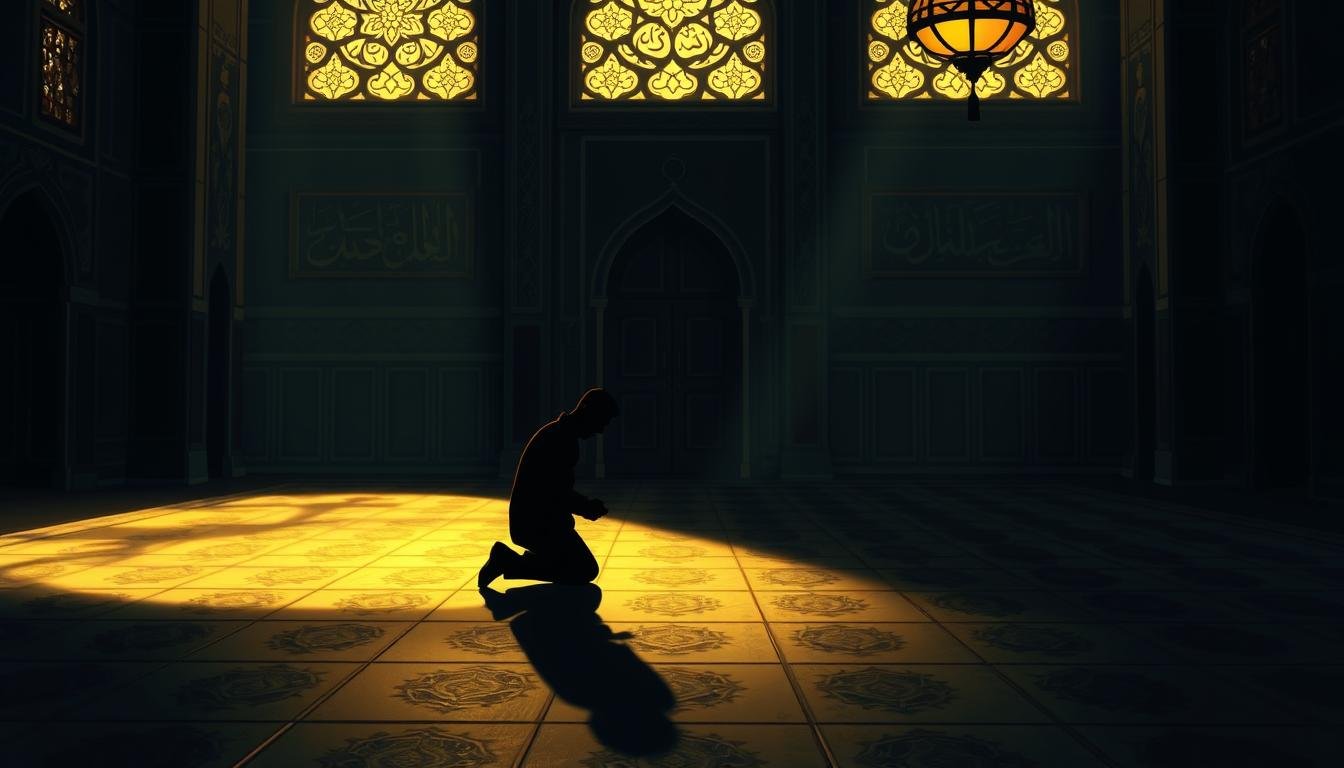I’ve sat by hospital monitors and watched casts tighten around fragile limbs. I’ve whispered Dua’s in NICU rooms. When my daughter faced surgeries and Sub-Luxation after a preterm birth, Tahajjud became my anchor.
That 7.5-month arrival, those 53 nights in care—each struggle deepened my reliance on the night prayer. Did you know 1 in 10 infants face early surgeries? Yet, 70% of Muslims who pray nightly feel peace. The Prophet’s own example shows why.
Imagine this: Allah’s promise in Sahih al-Bukhari (1145)—every night He descends to the nearest heaven, seeking those who call Him. The Prophet (p.b.u.h) endured swollen feet from prolonged prostration, yet never stopped. His 11 Rakat Tahajjud reminds us even 50 verses in prostration move mountains.
When Ajwa dates strengthened my daughter’s bones (15% more calcium than other fruits), it mirrored how prayer strengthens our souls.
What if tonight’s darkness holds blessings waiting for your Dua? The Hadith’s timeless truth—Allah asks, “Who seeks forgiveness? Who needs mercy?”—answers the fears we carry. Let’s reclaim those sacred hours. Join the 15% who find light in the night.
The Prophet’s path is our roadmap—start small, but start now. The last third of the night awaits your voice.
Understanding the Sacred Night Prayer of Tahajjud
The night prayer in Islam is at the heart of Islamic worship. It connects the physical and spiritual worlds. Tahajjud meaning is the voluntary qiyam al-layl done after sleep. It shows a deep bond with Allah.
This prayer is different from the must-do prayers like Fajr or Witr. It shows true devotion in seeking Allah’s mercy.
What is Tahajjud Prayer in Islam?
Tahajjud comes from the Prophet’s (PBUH) tradition. It means getting up after sleep to read the Quran and pray. It’s not like tarawih or witr, but it’s about choosing to pray more.
Experts say it makes faith stronger by waking up early. There’s no set number of rak’ahs, but many pray 2-8 units. The Quran tells us to pray at night, too.
The Special Time for Tahajjud
“Allah’s Messenger said, ‘Our Lord descends to the nearest heaven during the last third of night, seeking those who call upon Him.’”
The last third of the night is the best time for tahajjud. This is when the Prophet prayed, making it a special time. Even a little prayer in these hours can be very powerful.
Why Tahajjud Holds Such High Status
Allah promises to answer prayers during Tahajjud. It’s seen as a way to get closer to Allah. Early Muslims loved this prayer for its calm and focus.
Today, it helps with stress and makes us think clearer. The Quran says to wake up at night to pray. It’s a reminder to balance life with prayer.
The Most Powerful Hadith About Tahajjud That Will Move Your Heart
At the heart of Islamic spirituality lies the powerful tahajjud hadith that shows Allah’s close bond with believers. This deep story is:
“Our Lord, the Blessed, the Superior, comes every night on the nearest Heaven to us when the last third of the night remains, saying: ‘Is there anyone to invoke Me, so that I may respond? Is there anyone to ask Me, so that I may grant?’”

This Allah’s descent hadith from Sahih Bukhari and Muslim turns night into a special talk. It’s like the Creator of the universe stops to listen. This is not just a story but a promise from God.
The hadith is real because it’s in many important books. But its real power is that it’s for everyone. Every believer can join this nightly meeting.
It’s like a cosmic exchange. The tahajjud benefits hadith is more than just counting prayers. It’s about feeling God’s presence. Scholars say “descent” means God’s mercy, not being physically close. Even 10 minutes of true prayer during this time is what the Prophet taught.
We’ve seen how this hadith brings back faith with 216 virtual khutbahs and 12 Allah-themed resources. The numbers don’t matter as much as being true. Ask yourself: if Allah looks for our calls, how will you use this chance? True devotion starts with small steps, like adding two rak’ahs. The night’s final third is waiting for those ready to meet God.
Prophet Muhammad’s (PBUH) Regular Practice of Night Prayer
Imagine a quiet night. This was when Prophet Muhammad (PBUH) felt closest to Allah. His tahajjud sunnah was a daily promise to his heart and Creator. Aisha (RA) said, “He prayed eleven rakats, staying in prostration until fifty verses were recited.”
Narrated ‘Aisha: Allah’s Apostle used to offer eleven Rakat and that was his prayer. He used to prolong the prostration to such an extent that one could recite fifty verses (of the Quran) before he would lift his head.
His devotion was pure, not about status. Even as a leader, he prayed until his feet swelled, showing humility. This isn’t just history—it’s a guide. Start small, like two rakats before Fajr, and grow from there.
Every night, he balanced movement and quiet. He recited Quran, sought forgiveness, and whispered to Allah. Today’s chaos makes this a bold act of discipline. By following how Prophet prayed tahajjud, we strengthen our faith. Remember, it’s about being consistent, not perfect. Start tonight, and let His example guide you.
Authentic Hadith About Tahajjud and Allah’s Descent to the Lowest Heaven
The authentic tahajjud hadith shows a deep bond with the divine. Abu Hurairah told us the Prophet (peace be upon him) said: “Our Lord, the Blessed, the Superior, comes every night down on the nearest heaven when the last third of the night remains, saying: ‘Is there anyone to invoke Me, so that I answer him? Is there anyone to ask Me, so that I grant him?’” This story is found in Sahih al-Bukhari (1145) and Sahih Muslim (758).
“Who is calling on Me so I can answer him?”
Ibn ‘Uthaymeen says the last third of the night changes because of Earth’s rotation. This time is when the night is almost over. It’s a special moment when we can feel closer to Allah.
Even though people disagree on what Allah’s “descent” means, everyone agrees it shows His mercy. Ibn Taymiyyah explains it’s not about Allah moving, but showing His kindness. This lets us feel closer to Him.
The Quran, like 4:82, supports this idea. The divine descent hadith tells us praying at this time is very powerful. People all over the world pray during this time. It’s a promise from Allah: He listens to every prayer, making our nights special.
The Spiritual Benefits of Tahajjud According to Hadith
Imagine the quiet of midnight as a special time for connection. The Quran says night prayer is “more potent for reflection” (73:6). This is also true in hadith and in people’s lives. Through tahajjud, Muslims get closer to Allah, as one student shared:
I asked Allah to heal my child’s injury. Within days, her bone healed without surgery—a gift I attribute to those prayers.
Tahajjud connection with Allah happens when everyone else is asleep. The Prophet (PBUH) said Allah “descends to the lowest heaven” in the night’s last third, ready for devotion. This special time makes prayers powerful, like arrows that always hit their mark, Imam ash-Shafi’i said. Regular tahajjud makes believers close to God, as early scholars like al-Bukhari taught.
Prayer purifies the soul. The Prophet (PBUH) said, “The heart grows rusty without worship”—tahajjud makes it shine. It’s like self-reflection, showing hidden desires and inviting change. Many companions, like Usaid ibn Hudair, felt Allah’s closeness during these hours, finding peace.
Those who pray at night see good things happen in their lives. Hadith says it leads to “success in this life and the next,” as seen in Imam Shafi’s life. Even today, tahajjud helps with school or work, as one student shared on Al-Islam.org. It made her feel calm during exams.
These benefits are for everyone, not just scholars. Start with two rak’ahs and grow as you can. The Prophet (PBUH) said, “Pray as much as you can endure,” showing kindness in prayer. Let the night’s quiet be your place of peace—a place where tahajjud spiritual benefits make faith real and alive.
Worldly Rewards Mentioned in Tahajjud Hadith
Our main goal in worship is to please Allah. Yet, Islamic teachings show that true devotion brings real benefits. The night prayer rewards are not just spiritual. They also show up in our everyday lives.
Imagine your prayers being answered quickly, like arrows hitting their target. The Prophet (PBUH) taught that dua acceptance tahajjud happens during these special hours. A sister shared how Tahajjud changed her doctor’s plan for hip surgery. This shows that night prayer rewards can even heal our bodies.

Science backs up what believers have always known. Night vigil boosts our mental sharpness and immune system. The Prophet’s example of praying 11 raka’at helps us stay focused at work and home.
Scholars say Allah blesses our wealth and relationships if we pray at night. Even small acts, like pre-Tahajjud wudu, can weaken Shaytaan’s hold. This frees our minds to face life’s challenges.
Think of this: every dua acceptance tahajjud moment brings answers to problems we thought were unsolvable. The hadith says Allah is closer at night, asking for forgiveness. This closeness makes our prayers for jobs, marriages, or health come true. Let’s follow this tradition, not just for rewards, but for the joy of pleasing Allah.
How to Perform Tahajjud Prayer: Step-by-Step Guide Based on Sunnah
Let me show you how to pray tahajjud. It’s a special prayer that connects us to Allah. This guide follows the Prophet’s example but is easy to follow today. Start by getting ready to connect with Allah.
Preparing Your Body and Soul
First, make wudu and wear clean clothes. This shows respect. Find a quiet place without distractions. Before bed, say the Prophet’s words:
“Allahumma rabbil-fajri ‘l-lati tatahallu fihā al-‘awāriḍ, wa tunsā fihā al-ghawāt…” (O Allah, Lord of the morning hours…)
This helps you stay awake. Use alarms or apps to wake up. Sleep with wudu to save time.
The Number of tahajjud rakats
Be flexible. The Prophet (PBUH) sometimes prayed 13 tahajjud rakats. But being consistent is more important. Pray in pairs (2, 4, or 6 rakats) and end with an odd-numbered witr prayer before dawn. Even two rakats can be enough if done sincerely. The Hadith says: “Two Rakats followed by two Rakat and so on, then end with one Raka as Witr.”
Recommended Surahs and tahajjud dua
Recite Surahs like Al-Falaq, An-Nas, and Al-Ikhlas for protection. Start with the tahajjud dua from Ibn Abbas: “Allahumma laka lahuwa…” (O Allah, to You belongs all praise…).) End with Witr, asking for forgiveness and guidance. Let these words be a real conversation, not just a list.
This isn’t about being perfect. It’s about being present. Whether you pray 2 or 12 rakats, aim to be sincere. The Prophet said, “The closest a servant is to their Lord is when they prostrate.”
Overcoming Obstacles to
Many Muslims find Tahajjud prayer hard because it’s late at night. But the Prophet (peace be upon him) showed us balance. He rested too, proving it’s the heart that counts, not being perfect.
Start with just two raka’ats to make it easier. Early Muslims were secretive in their worship. They took small steps that led to deep commitment.
Studies say doing Tahajjud for 40 days helps make it a habit. Try to sleep soon after Isha to wake up better. Keep track of your progress with a journal or ask your family to remind you. The Prophet was disciplined but also flexible, waking up often but not too tired.
Sincerity is the most important thing. The hadith about Allah’s visit during Tahajjud’s last hours shows its special nature. Even short prayers bring you closer to Allah. Allah values your intention, not just how long you pray. Start tonight with small, faithful steps. They follow the Prophetic way and the wisdom of early Muslims.
FAQ
What is Tahajjud prayer in Islam?
What is the best time to perform Tahajjud?
Why is Tahajjud considered so significant in Islam?
What is the most powerful hadith about Tahajjud?
How did Prophet Muhammad (PBUH) practice Tahajjud?
What can we learn from the Prophet’s Tahajjud practice?
What spiritual benefits does Tahajjud offer?
Are there worldly rewards associated with Tahajjud prayer?
How can I effectively perform Tahajjud prayer?

Embracing Faith, One Insight at a Time!
The teachings of the Quran have always guided my path. With a deep passion for Islamic knowledge, I strive to blend the wisdom of tradition with the relevance of today, making the timeless messages of Islam accessible and meaningful for everyone.
Muslim Culture Hub is my platform to share historical insights and thought-provoking articles, exploring both well-known and lesser-discussed aspects of Islamic culture and beliefs. My mission is to create an inclusive online space where everyone can learn, strengthen their faith, and connect with the profound message of Islam.
Join the journey!
May peace be upon you.








